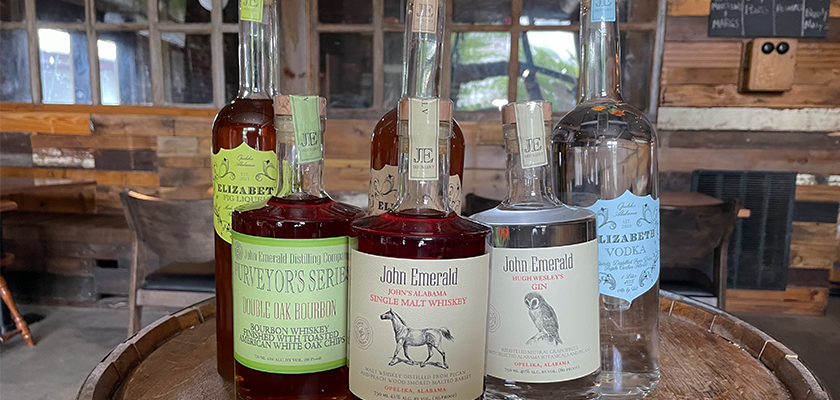Jimmy Sharp used to be a subcontractor. Now, he is the co-founder and head distiller of Alabama’s first whiskey distillery since before prohibition, the John Emerald Distilling Company.
John Emerald distills its craft single malt whiskey in revitalized downtown Opelika. John Emerald also produces a handful of other liquors, including vodka, bourbon, rye, rum, gin and liqueur.
John Emerald distributes its products to five different states. Organizations such as the Proof Awards, the World Spirit Competition and the International Spirits Awards have awarded its craft liquors gold, silver and bronze medals.
A part of the family history
John Emerald was founded by Jimmy and his father, John Sharp.
Jimmy Sharp traveled a lot when he was working as a contractor. “I was working in Brazil… when I got a call. It was my wife saying, ‘Hey, we’re having a kid.’ I was like, ‘Well, hey. I’m too far away to get that news,' so that was sort of the catalyst on pulling the trigger on starting the distillery.”
The Sharps named their distillery after Jimmy Sharp’s grandfather, John Emerald Sharp. Most of the Sharps’ spirits are named after family members. John Emerald’s vodka and liqueur label, Elizabeth, was named after his great grandmother, who Sharp said he ironically later found out to be a teetotaler.
“Since the future of our family was sort of the catalyst, we used the past of our family to name everything,” Sharp said.
The “motherland of whiskey”
Sharp said his Scottish heritage got him into whiskey in the first place. After trying different scotches and learning about the whiskey-making process, he decided to go to Scotland for a month to study the craft. “It was a great experience, mainly because I got an opportunity to go work at a more full scale… I loved it. It was great.”
Sharp did his internship at a Scottish distillery called Springbank, which was founded in 1828. “It was an awesome experience to go back to the motherland of whiskey.”
The owners of Springbank owned a more modern-style distillery next door, in which Sharp also got to work. He said that as a result of his experience, John Emerald’s style of distilling has become a marriage of traditional and modern whiskey-making methods.
Alabama's alcohol laws
Alabama enacted prohibition in 1907, over a decade before federal prohibition began. After prohibition ended in 1933, many jurisdictions in Alabama remained dry. Over time, many counties permitted the sale of alcohol, yet there are still a handful of dry counties today.
Alabama has a government monopoly over the wholesale of beverages with an alcohol content higher than 14% and all distilled spirits. This means that the state prohibits any competition in the sale of liquor and strong wines. The state-controlled wholesale of liquor is operated by the Alabama Alcoholic Beverage Control Board (ABC), which also operates retail stores of its own.
Sharp said when they were building their still, a discrepancy between state and federal law put him in an odd situation. The federal government wouldn’t award him a license until he constructed his still, but the state government required him to have a federal license before getting one from them. He said he had to call some officials to make sure he wouldn’t get in trouble for building the still, but everything worked out.
“Barring some uncomfortable jokes about how easy it would be to arrest me - [like] ‘That’ll be great. Thanks for the tip,’ that kind of stuff… everybody was fine. It was [like] ‘We got you. Just don’t turn it on. Don’t run it until you get all your licenses.’
“...For the most part, people were pretty helpful,” Sharp said. “We got a lot of help from the product management side of ABC. They were surprisingly good. ABC gets a bad rep a lot of the time, but really, they try to be as helpful as they can with the state of the laws we have.”
Sharp said that confusion and ambiguities around the law had him initially thinking that operating a distillery was illegal in Alabama. After talking to the owners of a vodka distillery in Florence, which is now closed, Sharp said he realized that having a distillery in Alabama was perfectly legal, and he and his father took the necessary steps to pursue their dream of operating one of their own.
The John Emerald Process
Sharp walked 1819 News through the process of how they make their single malt whiskey.
“The process begins with grain,” Sharp said.
According to Sharp, single malt whiskey is essentially scotch whiskey not made in Scotland. Though all whiskey uses a portion of malted barley, single malt whiskey is made only with malted barley.
Sharp said the next step is to mill the malted barley into a powder known as grist. The grist is used to make “mash” when combined with warm water, which allows enzymes in the barley to convert starches into sugars.
John Emerald single malt whiskey is made using a “wash,” which means Sharp and his employees extract the liquid from the mash when the mashing process is over, leaving the grain behind. Sharp said he gives the grain to local farmers, who use it for feed. “It’s free grain removal for us and free feed for them. It’s a nice symbiotic relationship there.”
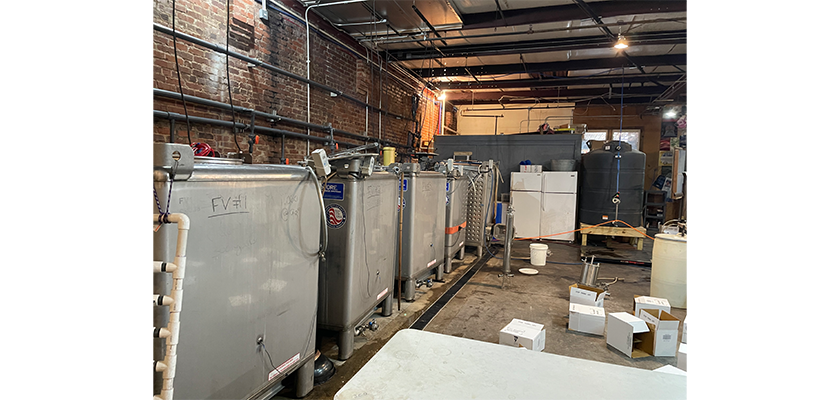
The liquid from the mash is transferred to a fermentation tank, where yeast is added. Yeast eats the sugars in the wash and creates alcohol. Sharp says it takes eight to ten days for John Emerald’s fermentation process to be complete.
When the wash is done fermenting, distillers are left with “distiller’s beer,” which is pretty much beer, but not beer anyone would want to drink, according to Sharp. He said their distiller’s beer is typically around 8% alcohol.
To turn the distiller’s beer into liquor, Sharp moves it to a still, which heats it up, causing the alcohol to evaporate. When it condenses back into liquid, it is in a concentrated form, officially liquor. “Distillation is not creating any alcohol. It’s just separating alcohol.”
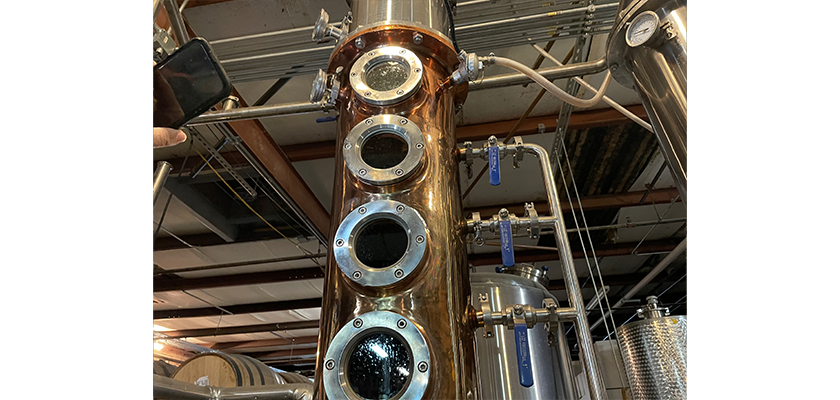 Sharp said it’s important to cut different ends of the alcohol out of the mix. “The heads are the bad alcohols that come at the beginning of the run. The hearts are the good alcohols at the center of the run and the tails are the bad alcohols at the back end of the run… How deep you cut out the heads and how deep and shallow you cut out [the tails] affects the final product… That’s really what separates top shelf from bottom shelf, in my opinion, is how well those cuts are made.”
Sharp said it’s important to cut different ends of the alcohol out of the mix. “The heads are the bad alcohols that come at the beginning of the run. The hearts are the good alcohols at the center of the run and the tails are the bad alcohols at the back end of the run… How deep you cut out the heads and how deep and shallow you cut out [the tails] affects the final product… That’s really what separates top shelf from bottom shelf, in my opinion, is how well those cuts are made.”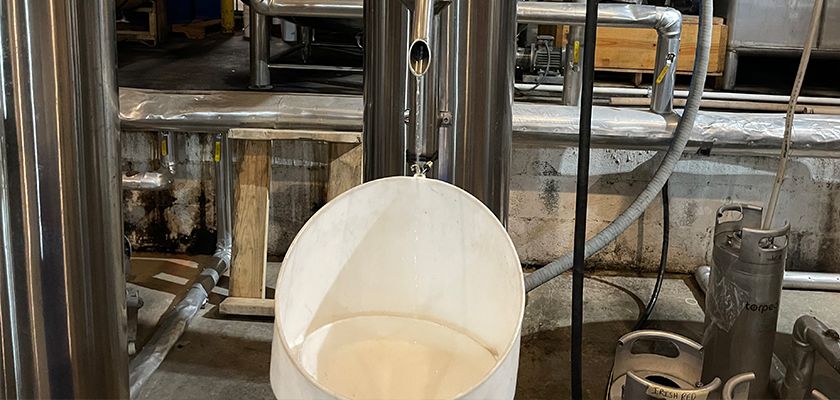
When the whiskey comes out of the still, it is clear, much like water. Whiskey obtains its brown color and some of its flavors from the aging process. John Emerald single malt is aged in “virgin casks,” or charred barrels which have never been used to age liquor before.
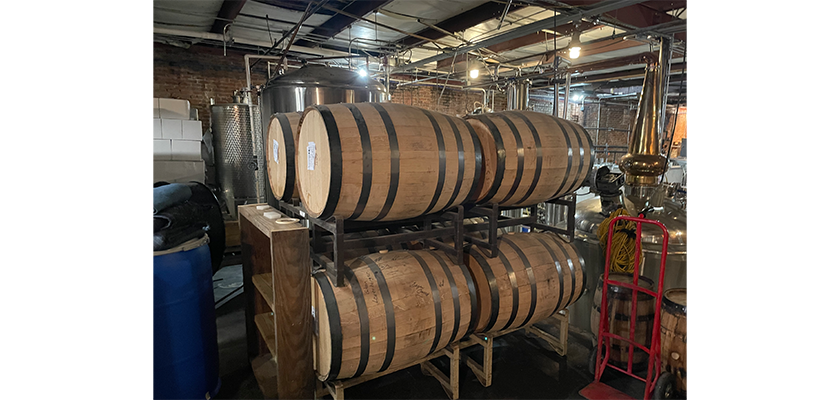
Sharp said they sample each barrel to tell if the whiskey is finished. Barrels that are deemed ready are emptied into a vat and mixed, averaging the variations between batches. Then, the distillers proof the whiskey down to a desirable level using reverse osmosis filtered water. “It’s going to reduce the proof to where we want it but not alter the flavor of the whiskey at all.”
John Emerald’s bottling process is a mix between manual and automatic, but Sharp said he’s looking into purchasing an automated bottling machine in the future. “It wouldn’t really eliminate jobs. It just means the same two people doing it now would just be doing a lot more.”
Sharp said the distillery sometimes hosts bottling parties, where groups are invited to help bottle large batches while enjoying drinks, music and food. “That’s usually a pretty fun time. People enjoy it.”
Other products
Sharp said they’re often able to experiment with new ideas due to their relationship with local agriculture.
Gene’s Spiced Rum and Spurgeon’s Barrel-Aged Rum are both made from sugar cane grown in Headland. The spiced rum is flavored with cinnamon, vanilla, anise and pecans. Aged rum is placed in the barrel for around two years.
Hugh Wesley’s Gin is made from wild junipers that the Sharps pick themselves. Sharp said he estimates Hugh Wesley’s may be the only gin in the world that uses the local juniper, Juniperus virginiana. “It makes a pretty unique tasting gin… not as piney, a little bit more botanical and floral compared to that super piney bite you get from a lot of traditional gins.”
Sharp said he occasionally distills muscadine brandy using muscadine wine from local wineries. He uses the single malt barrels to age it. “We always joke, we’ve got the world’s best muscadine brandy because it’s the world’s only muscadine brandy.” The muscadine brandy is almost exclusively sold in-house, but he said they might look into making larger batches in the future.
Sharp said he tinkered around with figs he received from the farmer who grows his sugar cane in Headland and arrived at the idea of a fig liqueur.
John Emerald also distills pecan and satsuma liqueur, vodka, rye and bourbon.
All John Emerald liquors are sold at the distillery in Opelika, and many of them can be found in most ABC Stores across Alabama.
To connect with the author of this story, or to comment, email will.blakely@1819news.com.
Don’t miss out! Subscribe to our newsletter and get our top stories every weekday morning.


